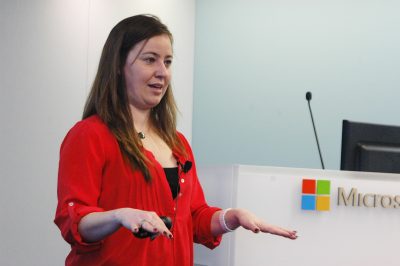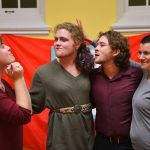
Attendees at Cambridge’s Women in Data Science conference talked about networks but not just the kind that electrically connect robots and weather forecasting models. This conference, held Friday at more than 75 locations worldwide, brought together people of different backgrounds to celebrate the accomplishments of women in STEM fields.
The all-day conference occurred everywhere from Iceland to Texas and featured a live stream from Stanford University, where the main conference was held, as a way to connect underrepresented female scientists.
“At most of the things I go to, there are so few women; it’s disheartening,” said Nabila Baba-Ali, a consulting systems engineer at ODA Optics. “There is a need to create forums for women in science.”
Throughout the day, female experts presented their cutting-edge research in data science and shared their experiences to a few hundred attendees at the Massachusetts Institute of Technology’s New England Research and Development Center.
Angela Bassa, who runs data science research at iRobot, discussed some specific research she’d done, but she mainly focused on how she gets her team to work together. She said her company creates robots that do “boring tasks” for people, but there’s a tension between the academic and business side of her work.
She emphasized a need to incorporate the business-focused engineers with the academically-driven researchers in the decision-making process. As an academic, she noted that finding common ground with business-minded colleagues could be difficult.
“Throwing data at them won’t work,” she said. “You’ll have to interpret it for them [with visuals].”
Attendees also watched a live stream from Stanford, where Diane Greene shared her experience working at Google. The live stream featured videos from viewers around the world attending their own Women in Data Science conferences.
While the event did focus on sharing new research, periodic breaks offered attendees the opportunity to connect with each other.
Sharon Chou, a data scientist at FirstFuel Software, said she enjoyed meeting a wide variety of like-minded individuals, from undergraduate students to experts in the field.
“This conference is one example of trying to be inclusive in a field historically dominated by men,” Chou said.
According to the National Center for Women and Information Technology, women make up 25 percent of the computing workforce, though they make up over half of all bachelor’s degree recipients.
Chou said the racial component of underrepresentation in the STEM field is also alarming. Asian women make up just five percent of the computing workforce, with black and Hispanic women in even fewer numbers.
Katherine Chen, a senior at Harvard University, said she attended the conference because she was excited to learn more about the industry.
“It’s an opportunity to see all the cool things you can do in data science,” she said.
Later in the day, Caroline Uhler, a professor at MIT’s Institute for Data, Systems, and Society, shared her research on weather forecasting models and her work with genetics.
Audience members listened, taking notes on Uhler’s data-driven research and its implications. Though they varied in age, nationality, race and experience. Most of the attendees were women.
Amy Prager, a lecturer in Cornell University’s Department of Mathematics, said she could see both sides of the gender divide. As a trans woman, Prager transitioned while working in the technology industry, which opened her eyes to the field’s discriminatory environment.
“When you’re the dominant group, you don’t see how oppressed the oppressed are,” she said.
Michael Clark, a specialist with a management consultant firm, was one of the few men in attendance.
“It’s this perfect irony: a conference about women in data science is 98 percent attended by women,” he said, noting that he wished more of his male colleagues would support women in the field.
Supporting the research of scientists abroad is important, he said, but there is plenty of potential in underrepresented populations in our city.
“We complain about not having enough talent … The fact is that we have lots of talent right here,” Clark said. “Boston is a hotbed for talent.”


